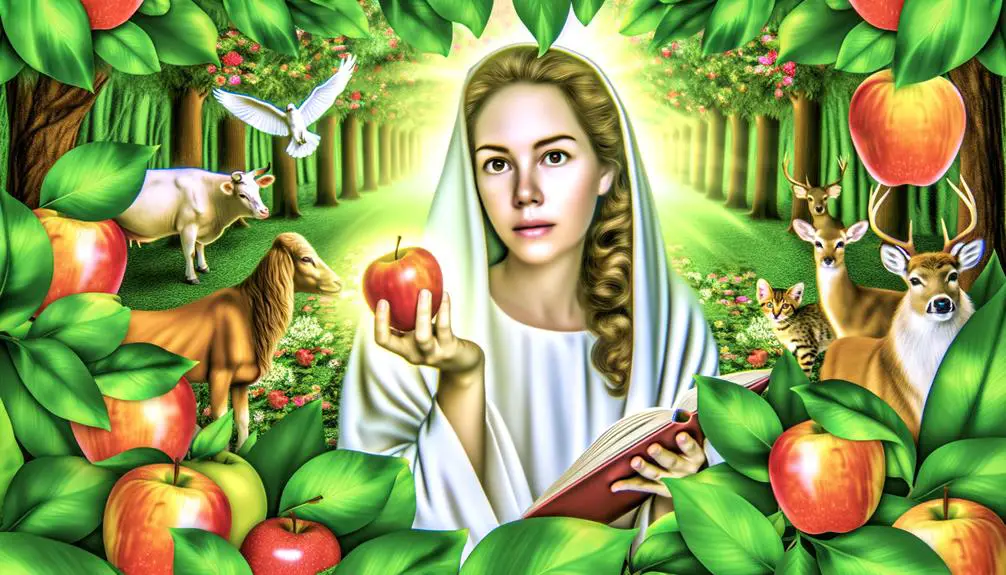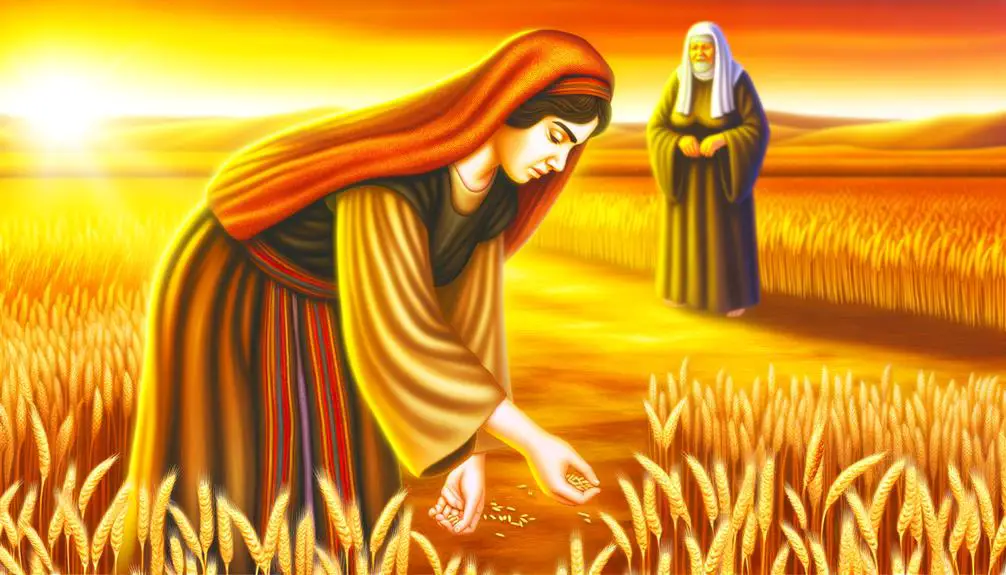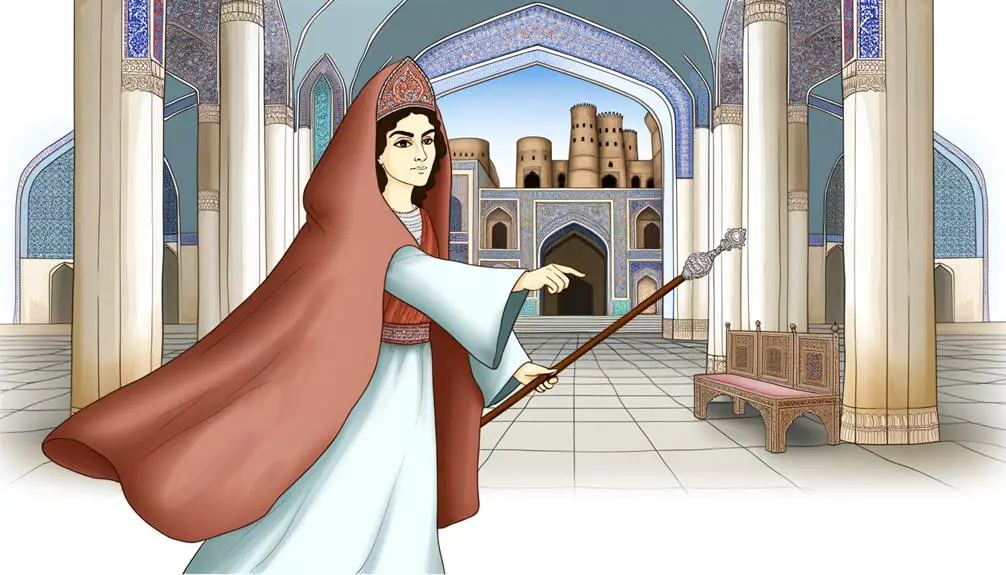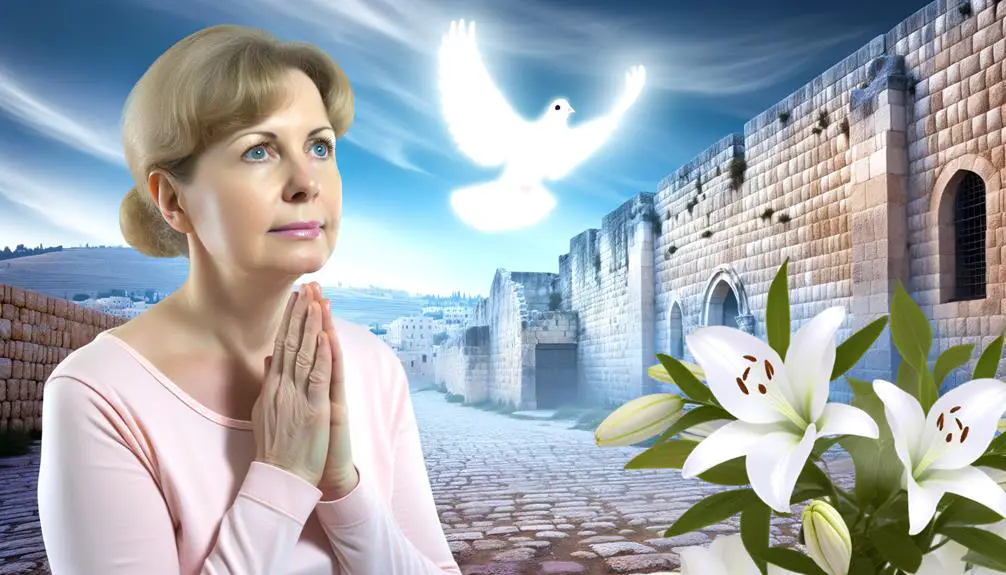Yearn to uncover the resilience and complexity of biblical women, from Eve to Mary, in a narrative that redefines strength and faith.

Pictures of Women in the Bible
Consider Eve, often depicted as humanity's first mother and the pioneer in the vast garden of biblical women's narratives. You'll find her story isn't just about the fall of man but also about the complexities of choice, consequence, and the enduring strength of women.
As you explore further, characters like Sarah, Ruth, Esther, and Mary offer not just tales of faith and resilience but also provide a mirror reflecting the multifaceted roles of women throughout history. Their stories, layered with challenges and triumphs, invite you to contemplate the profound impact these figures have had on cultural and spiritual understandings of womanhood.
Why stop at Eve, when there's a whole lineage of intrigue and inspiration awaiting your attention?
Key Takeaways
- Women in the Bible embody themes of resilience, faith, and divine intervention.
- Figures like Mary, Ruth, and Esther highlight the profound impact of women's actions in biblical narratives.
- Their stories illustrate a spectrum of devotion, bravery, and grace amidst adversity.
- Biblical women's legacies serve as foundational models for understanding virtue, sacrifice, and the human-divine relationship.
Eve: Humanity's Matriarch

Eve, often recognized as the mother of all living, holds a pivotal role in the narrative of humanity's genesis, inviting an in-depth exploration of her influence and legacy. As you delve into the story of Eve within the context of the Garden of Eden, it's imperative to understand her contribution to the concept of original sin, a fundamental aspect that has shaped theological discourse for centuries.
In the Garden of Eden, Eve's decision to eat the forbidden fruit, as well as her subsequent encouragement of Adam to do the same, marks the inception of original sin. This act of disobedience against God's command not only led to their expulsion from paradise but also introduced sin and mortality into the human condition. Eve's role in this event has been interpreted in various ways, often serving as a foundation for discussions on free will, temptation, and the inherent nature of humanity.
Analyzing Eve's legacy, it's crucial to recognize how her actions in the Garden of Eden have influenced perceptions of womanhood and morality throughout history. Despite the negative connotations associated with original sin, Eve's story also offers insights into resilience, redemption, and the complex dynamics of human choice and consequence.
As you reflect on Eve's place within the biblical narrative, it's essential to approach her story with a nuanced perspective that acknowledges her as a multifaceted figure. Her journey from the Garden of Eden to becoming the mother of all living encapsulates themes of growth, transformation, and the enduring impact of one's actions on subsequent generations.
Sarah: Mother of Nations

How does Sarah, revered as the Mother of Nations, exemplify the profound impact of faith and perseverance in biblical narratives? Sarah's story is a testament to the complexities and depths of faith, especially when faced with seemingly insurmountable challenges. Her journey, marked by Sarah's barrenness and the Divine promises made to her, stands as a powerful narrative of hope and the fulfillment of faith.
Sarah's life is characterized by several key elements:
- Sarah's barrenness: It serves as a central theme, highlighting her initial despair and the societal pressures she faced. Yet, it also sets the stage for the miraculous to occur, showcasing her resilience and faith in the face of adversity.
- Divine promises: Sarah's life was transformed by Divine interventions and promises. These moments not only underscore her special role in biblical history but also illustrate the close relationship between faith and Divine fulfillment.
- Perseverance in faith: Despite her doubts and the long wait, Sarah's perseverance in faith ultimately leads to the birth of Isaac, fulfilling the promise that she'd be a mother of nations.
- Impact on future generations: Sarah's legacy is immense, influencing not just the immediate narrative but shaping the faith and identity of countless generations to come.
Sarah's story, rich in themes of faith, perseverance, and Divine intervention, offers a profound insight into the human experience with the Divine. Her journey from despair to fulfillment serves as an enduring example of the power of faith and the significance of Divine promises in biblical narratives.
Ruth: Loyalty Embodied

Ruth's unwavering loyalty to her mother-in-law, Naomi, serves as a cornerstone of her narrative, epitomizing the virtue of fidelity within the tapestry of biblical stories. Ruth's decision to stay with Naomi, despite her own Moabite lineage and the death of her husband, Naomi's son, illustrates a profound commitment that transcends familial and cultural boundaries.
This narrative unfolds against the backdrop of the harvest, a period teeming with symbolic significance. The harvest not only provides the physical setting for Ruth's story but also metaphorically represents a time of reaping what one sows, both in terms of crops and in life. Ruth's hard work and dedication during the harvest are rewarded, not just with physical sustenance but with a place within a community and lineage that would shape the course of biblical history.
Boaz, a relative of Naomi's late husband, embodies kindness and the protective provisions of the law for widows and foreigners. His actions towards Ruth, driven by respect for her loyalty and hard work, reflect a divine kindness that underscores the narrative's themes of redemption and providence.
The table below highlights key aspects of Ruth's story:
Aspect |
Significance |
Implication |
|---|---|---|
Loyalty |
Ruth's commitment to Naomi |
Fidelity transcends origins |
Harvest |
Setting & metaphor for reaping rewards |
Symbol of renewal |
Boaz's kindness |
Reflects divine providence and societal obligations |
Redeems Ruth's situation |
Integration |
Ruth's acceptance into a new community |
Unity and acceptance |
Legacy |
Ruth's role in the lineage of David |
Importance of faithfulness |
Ruth's story, therefore, isn't just about loyalty; it's a testament to the power of kindness, perseverance, and the unexpected ways in which devotion can shape destinies.
Esther: Bravery Unveiled

Just as Ruth exemplifies unwavering loyalty, Esther's story unfolds to reveal the unparalleled courage she displayed in the face of existential threats to her people. Her narrative is steeped in Persian intrigue and a beauty contest that ultimately positions her as queen, but it's her actions thereafter that cement her legacy in biblical history.
Esther's bravery isn't impulsive; it's calculated. Understanding the risk of approaching the king unsummoned, which could lead to her death, she weighs her options meticulously. Her decision to act, despite the personal danger, showcases a profound commitment to her Jewish heritage and her people's survival.
Consider these elements of her story:
- Persian Intrigue: Esther navigates the complexities of life in the Persian court, using her intelligence and wit to gain favor and influence.
- Beauty Contest: Her participation in and eventual victory in this contest isn't merely about aesthetics but marks the beginning of her journey towards becoming a savior for her people.
- Strategic Courage: Her bravery isn't reckless but strategic, employing patience and timing to maximize the impact of her actions.
- Legacy of Advocacy: Esther's story is a testament to the power of advocacy and the impact one individual can have on the fate of an entire community.
In essence, Esther's narrative is a remarkable testament to bravery, intelligence, and advocacy, making her one of the most inspiring figures in biblical lore.
Mary: Grace and Devotion

Amid the narratives of courage and loyalty in the Bible, Mary's story shines as a profound example of grace and devotion. Her life, marked by the miraculous virgin birth of Jesus, is a testament to her unwavering faith and willingness to serve. You'll find her story isn't just about accepting the angelic announcement with humility; it's a narrative that weaves through the very fabric of devotion and sacrifice, setting a precedent for grace under pressure.
Aspect |
Description |
Significance |
|---|---|---|
Virgin Birth |
Mary conceives Jesus while still a virgin, fulfilling ancient prophecies. |
Demonstrates divine intervention and the miraculous nature of Jesus' conception. |
Angelic Announcement |
An angel announces to Mary that she will bear the Son of God. |
Marks Mary's acceptance of her role with grace and faith, despite the societal implications. |
Devotion |
Mary's unwavering support for her son, Jesus, throughout his life and ministry. |
Illustrates the depth of her faith and the strength of her character. |
Grace |
Mary faces societal challenges with dignity and poise. |
Showcases her extraordinary resilience and trust in God's plan. |
Sacrifice |
Mary endures the pain of watching her son's crucifixion. |
Highlights her profound love and devotion, emblematic of ultimate sacrifice. |
Mary's narrative offers an intricate portrayal of a woman who embodies grace and devotion amidst profound challenges. Her story, replete with the virgin birth and the angelic announcement, stands as a beacon of faith, showing you the power of acceptance and the strength found in unwavering devotion. Mary's journey encourages you to look beyond the surface, recognizing the depth of commitment and the purity of unconditional love.
Frequently Asked Questions
How Have Depictions of Women in the Bible Evolved in Art and Literature Throughout History?
You've noticed that depictions of women in art and literature have significantly evolved over time. Initially, portrayals were heavily influenced by cultural and religious norms, often limiting women's roles.
However, during the Renaissance, depictions became more nuanced and diverse, showcasing women's strength and complexity. Today, you'll find gender-neutral portrayals, reflecting a broader understanding of gender and identity.
This evolution highlights society's changing perceptions towards gender roles and women's representation.
In What Ways Have Modern Interpretations of Biblical Women Influenced Contemporary Gender Roles and Feminism?
As the saying goes, 'A picture is worth a thousand words,' modern interpretations of biblical women have reshaped our understanding of gender roles and feminism.
By challenging traditional gender stereotypes and incorporating feminist theology, these interpretations have provided a fresh lens through which to view contemporary gender issues.
They've encouraged a reevaluation of societal norms, pushing for a more inclusive and equitable perspective on gender roles in today's world.
Are There Any Archaeological or Historical Evidences That Validate the Existence of These Biblical Women?
You're diving into whether there's tangible proof of biblical women's existence. Genetic studies and inscription analysis have been pivotal in this quest.
While genetic research hasn't directly linked to specific individuals, it's illuminated ancient populations' dynamics.
Inscription analysis has been more fruitful, uncovering names and roles that align with biblical accounts, offering a scholarly and respectful validation to these historical figures while enriching our understanding of their genuine impact.
How Do Different Religious Traditions Interpret the Roles and Significance of These Women Differently?
You'll find that religious traditions vary widely in their interpretation of women's roles and significance, shaped largely by cultural perceptions and theological debates.
For instance, some view these women as primarily supportive figures, while others highlight their leadership and prophetic roles. This diversity stems from different readings of sacred texts, influenced by historical contexts and evolving understandings of gender.
It's a complex interplay of tradition, scripture, and contemporary values.
What Are Some Lesser-Known Women in the Bible Who Have Played Pivotal Roles, and Why Are They Not as Prominently Featured in Religious Teachings or Texts?
You're exploring the shadows of history, where lesser-known women of the Bible linger, pivotal yet veiled.
Their stories, rich in courage and wisdom, often remain unheard due to cultural biases that historically silenced women's voices.
This oversight isn't just about forgetting names; it's about missing the diverse contributions these women made.
Their absence in religious teachings hints at a broader issue of recognizing and valuing women's roles across all facets of society.
Conclusion
In the tapestry of biblical narratives, you've encountered Eve, Sarah, Ruth, Esther, and Mary—each weaving threads of humanity, faith, and resilience. You've seen Eve's creation, Sarah's patience, Ruth's loyalty, Esther's courage, and Mary's grace.
These women, in their unique ways, mirror the complexity and strength found within all of us. Through their stories, you've embarked on a journey that not only reflects ancient wisdom but also resonates with contemporary lessons of perseverance, faith, and empowerment.



Sign up